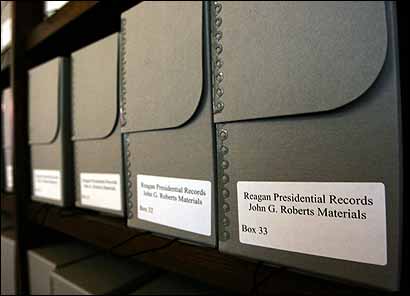http://www.boston.com/news/nation/washington/articles/2005/08/19/roberts_as_reagan_aide_backed_national_id_card/
By Charlie Savage and Rick Klein, Globe Staff | August 19, 2005
WASHINGTON -- As a legal aide in the Reagan administration in 1983, Supreme Court nominee John G. Roberts Jr. declared that he would support creating a national identification card in order to combat ''the real threat to our social fabric posed by uncontrolled immigration," a memo released yesterday by the National Archives revealed.
In a memo that offered new insight into how he might rule on cases that test the balance between national security and civil liberties, Roberts said he ''yield
to no one in the area of commitment to individual liberty against the spectre of overreaching central authority." However, he wrote, ''We already have, for all intents and purposes, a national identifier -- the Social Security number -- and making it in form what it has become in fact will not suddenly mean Constitutional protections would evaporate and you could be arbitrarily stopped on the street and asked to produce it."
The memo, written to his boss, White House counsel Fred Fielding, was among nearly 39,000 pages of documents released yesterday from Roberts's tenure as an associate White House lawyer. The documents revealed Roberts's opinions on social and legal issues including the First Amendment, the role of judges, and programs intended to bring equality to women in the workplace.
One internal memo could be of particular interest during Roberts's upcoming hearings before the Senate Judiciary Committee next month. In it, he ridiculed an anticrime proposal by Senator Arlen Specter, a Pennsylvania Republican who is the current chairman of the judiciary committee. As a younger senator in 1983, the memo showed, Specter had proposed the federal government help fight violent crime by allocating an additional $8 billion a year to federal law enforcement agencies. In an advisory memo, Roberts said it was unlikely Specter's proposal ''will receive any serious consideration" because the plan is ''the epitome of the 'throw money at the problem' approach" that the Reagan administration had repeatedly rejected.